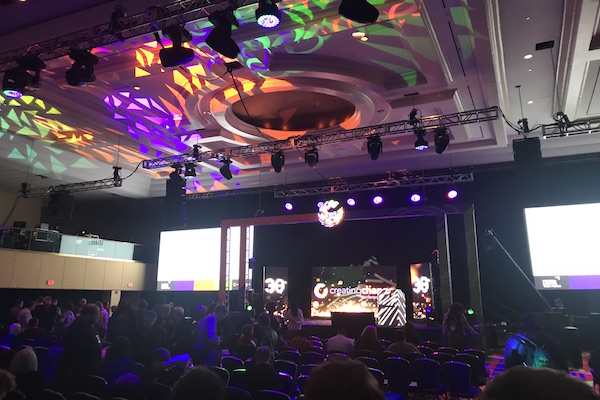The 2018 Creating Change Conference painted the Marriot Wardman Park Hotel in Washington, D.C. in every shade of the rainbow. This year marked the 30th year of the revolutionary conference, coinciding with the first anniversary of the new presidency and a year that brought together the LGBTQ community, some might say, in ways good and bad.
Workshops throughout the days evolved into more specific brandings and intersections, particularly concerning ways to combat current anti-LGBTQ policies. Workshop sessions were broken down by categories that offered identity-specific content that functioned beyond the LGBTQ spectrum. These included democracy and civil engagement, non-discrimination protections, economic inequality and poverty, health care access, faith and spirituality/practice spirit, do justice, criminal justice, and immigration.
American University senior Lee Clyne, who attended the conference for the first time, found that beyond workshops that appealed to parts of their identity, the general space of being around other LGBTQ people to be refreshing and simply put, happier.
“I think sometimes you don’t know how alone you feel until you meet someone who says, ‘Me too,’ or ‘I feel that,’ or ‘Do you want a hug?’” they said. “I learned some amount of self-love by being in these spaces that validated me, with people who could relate to me. That was something I was lacking in my personal life, and something I needed.”
Workshops provided outlets of dialogue and mutual respect that aimed to honor every identity within that space, the emphasis on identity evident in programming. Closed captioning, translators, and self-care rooms were among some of the features of each session. From sessions titled “Decolonizing, Disrupting, and Dismantling Queer Movements in the Imperialist Church” to “Queer Parenting” to “Nonbinary POC Caucus,” the conference aimed to be more encompassing of all identities.
Sarah Massey, the communications director of the National LGBTQ Task Force, agrees that the visibility of a national conference like Creating Change provides an opportunity that must be taken by those attending. As someone who has over 20 years’ experience in social justice, Massey has seen the way activism has evolved to become more inclusive and intersectional, particularly in the LGBTQ community.
“The LGBTQ community shows what resiliency really is,” she said. “We’ve gone through this before in different ways, so none of us are complacent. We are active, we are building, we are strong.”
Massey also highlighted the new wave of activism coming directly from the young LGBTQ community and the utter lack of concern regarding age-old binaries. She discussed the importance of intergenerational learning, not only at the conference but in the grand scheme of activism.
“Challenge me, make me think about it differently,” Massey said. And her words were echoed in the workshop sessions at the conference. Beyond the current political state of the country and the seemingly unending piling of anti-LGBTQ rhetoric, Creating Change’s community-building workshops and events allowed for new conversation among a growing community.
Both Massey and Clyne recognize that Creating Change offers more than workshops, parties and events, marketing, or networking, and see ways that it can be improved in the future for even more accessibility and inclusivity. It’s a conference that heightens the visibility of a community that has suffered a year of prominent backlash and discrimination.
“Creating Change offers a unique and wonderful opportunity to be in a space of people who are like you,” Clyne said. “They have felt some of the things that you have felt, or who support you and celebrate your differences, whilst learning, growing, and working together to tackle societal problems.”


